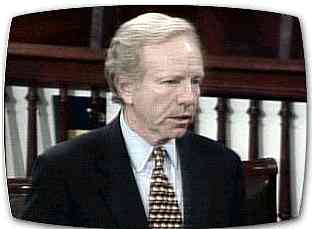|
|
Jewish World Review /Sept. 9, 1998 / 18 Elul, 5758
Ben Wattenberg
Last week's solemn and majestic speech by Sen. Joseph Lieberman,
D-Conn., on the floor of U.S. Senate showed that what Lieberman believes
is what the great majority of Americans believe, and what a great
majority in Congress believes.
I cannot recall a single political speech that has had such an impact
all across the political spectrum. Lieberman was the boy who said the
Emperor had no clothes. Of course! That's it! It was immoral, not just
inappropriate! It was not just private acts, but private acts with
massive public ramifications! It was corrupting our children and our
culture! Even Clinton had to say, Amen.
It is a testament to the stature that Lieberman has gained in the
nation's Capitol that there was next to no comment made that his speech
might have been motivated by personal political gain. This, in a town
where going to the grocery store is seen to have an agenda behind it.
Lieberman is indeed a man of honor. Clearly, it was not a politically
motivated address.
But that is not the same as saying that what happened will have no
effect on Lieberman's political future.
Back in March of this year, after interviewing him, I wrote a column
urging that Lieberman run for President in the 2000 Democratic
primaries. I also suggested that he might well do that, and if he did
it, he could win. The Connecticut papers picked it up. Lieberman
dampened speculation. Like many others mentioned by mentioners, he said
he'd only look at it after the 1998 Congressional elections. Unlike most
other mentionees, he has apparently done nothing about it behind the
scenes. But he did not say that he wasn't going to run.
Now the situation is different. The 1998 elections are just ahead.
Lieberman has suddenly become a national figure.
I have not interviewed Lieberman for this column. I suspect he would not
want to play any part in linking his own political future to the
unraveling scandal while it is still unraveling. Properly so.
But what is binding on him is not binding on us. Lieberman is, in my
judgment, the Democrat most qualified to be President of the United
States. He is the Democrat, a realistic activist of the political
center, who could get the most votes in a general election. If he can't,
or won't, do anything about it now, that does not mean that voters and
political leaders should not speak out, and start organizing.
What's in Lieberman's future now? Three scenarios present themselves.
1) If President Clinton should become ex-President Clinton, then the new
President, Albert Gore, will nominate the new Vice President, who must
then be confirmed by a majority of both houses of Congress. Lieberman
would probably be Gore's most confirmable pick. He would send the right
signal regarding what is proper and improper in American public life. He
would offer Gore, who has been playing to the left side of the
Democratic gallery, an opportunity to come back toward the mainstream of
the political spectrum. That is where he has
to be in order to be re-elected on his own in 2000.
2) After the Congressional elections, Lieberman could announce his
candidacy for the Presidency in 2000. He could win the nomination,
possibly even against a scandal-tainted Gore, and possibly early on, as
a "national primary" now looms likely. It happens all the time to
candidates who start out unknown. Think Willkie, Goldwater, Kennedy,
McGovern, Carter, Dukakis, Clinton. All such a potential candidate has
to do is become better-known and well-funded, which Lieberman now is,
and can be.
Lieberman should run as "the real Clinton." That is, the man who could
bring his left-leaning party back to the center, working at it every
day, not just when politically convenient, as Clinton too often has
done. It can happen. Prime Minister Tony Blair, in England, is doing it.
3) Lieberman comes from Connecticut, roughly a 50-50 toss-up state. In
1994, a big Republican year, he got 67 percent of the vote in his run
for Senate re-election. In 2000, if neither of the other scenarios work
out, Lieberman can still run for Senate, and might possibly top 75
percent. He will be 58 years old.
Any or all of these scenarios is enhanced if Lieberman's supporters
start a movement to draft
 Draft Joe Lieberman!
Draft Joe Lieberman!
A POTENTIALLY GREAT POLITICAL LEADER not only knows what the public
feels in its heart, but feels it in his or her own heart. From that
sense flows both credibility and compass. If and as the public senses
such qualities, it can act with speed and purpose.
This: Bill Clinton's immoral behavior has
done us dirt, and, much as we'd like to put it behind us, we'll have to
wait for awhile until we figure out just what sort of rebuke he
deserves.

Lieberman delivering his speech

9/03/98: Get over it, folks
8/28/98: McGwire. Maris. Ruth. Clinton.
8/20/98: Is consuming a Big Mac eating?
Ben Wattenberg is a senior fellow at the
American Enterprise Institute
and is the moderator of PBS's "Think Tank."